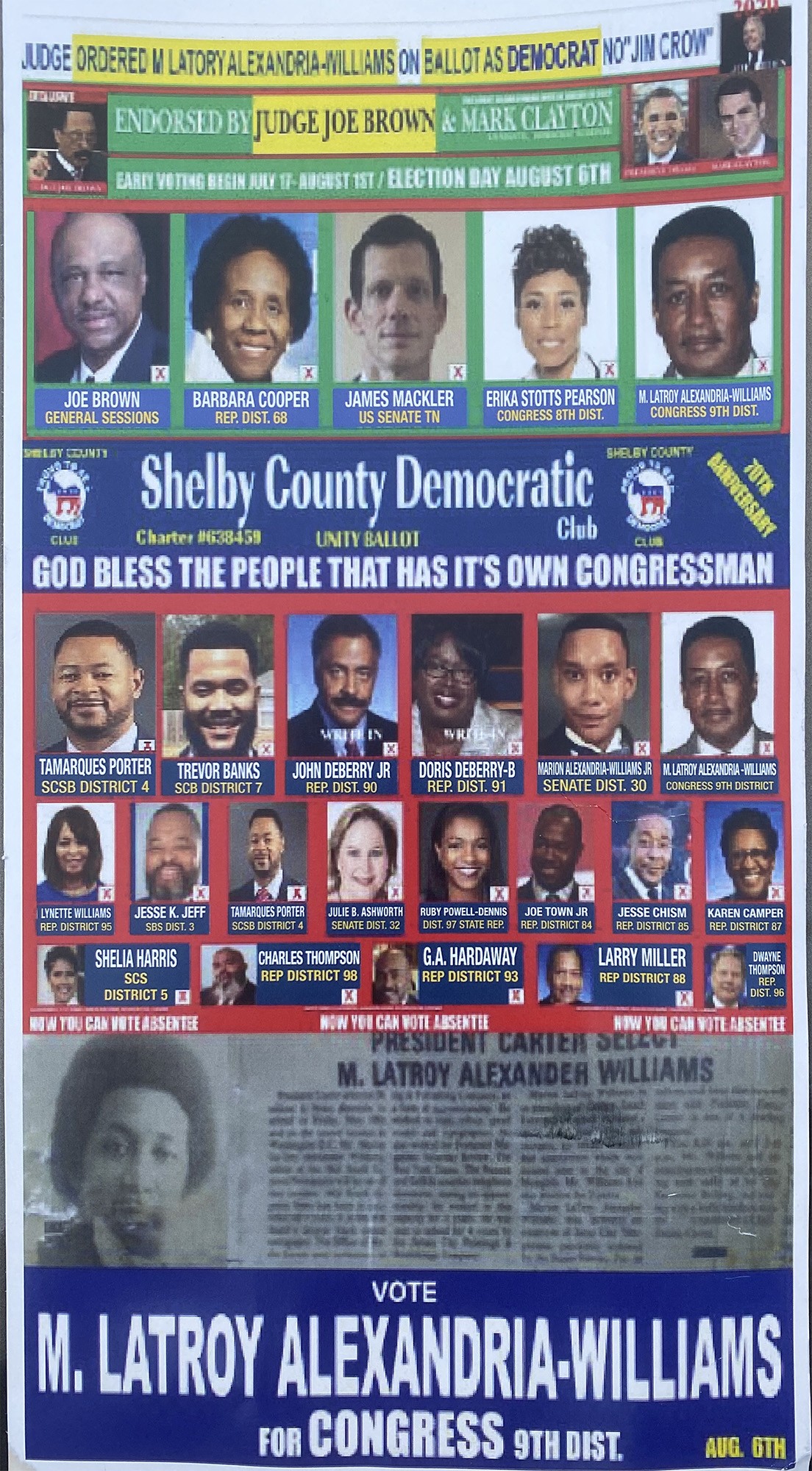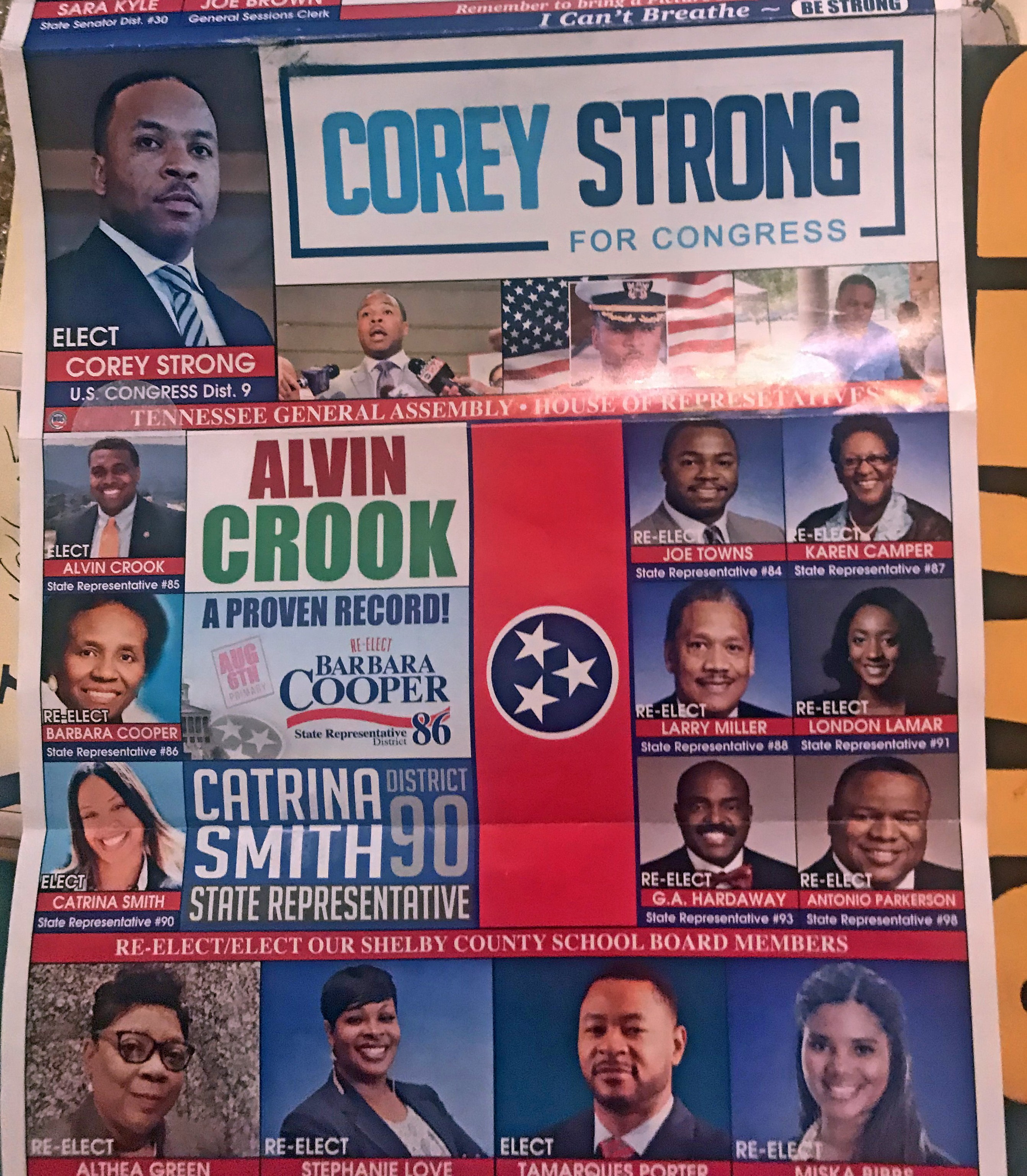We use the term “bogus ballot” to denote a species of advertisement sheets and/or four-page mailouts which contain the names and pictures of political candidates who have paid some local entrepreneur for the privilege of appearing on them — often in overtly devious ways that suggest, falsely, that the Democratic Party is behind the endorsements.

the new M. LaTroy Wiliams ballot in which he misspells his own name; note streamer line across top
Two of the entrepreneurs — Greg Grant and M. LaTroy Williams — are at it again this election season, though they have been enjoined by a court to cease and desist. Meanwhile, attorneys for the plaintiffs, who in 2019 sought and got an injunction against the balloteers, are taking the pay-for-play mischief-makers to court.
More of that anon: A brief time-out here to proclaim our astonishment at the streamer line that Williams appended to the top of his most recent “ballot.” It says, in bold capital letters: “JUDGE ORDERED M. LATORY [sic] ALEXANDRIA-WILLIAMS ON BALLOT AS DEMOCRAT NO ‘JIM CROW’”.
Not only is that claim wholly untrue regarding the congressional office Williams (or Alexandria-Williams as he now signs himself) was seeking until an April meeting of the state Democratic executive committee declared him invalid. It is a uniquely skewed falsehood in that the man manages to misspell his own name, which is “LaTroy,” not “LaTory.”
Anyone who cares to confirm that Williams’ name is not on the August 6th Democratic primary ballot for any office at all need only consult the website of the Shelby County Election Commission (shelbyvote.com). Yet on his own self-published “ballot” (more properly regarded, perhaps, as an advertisement sheet for the favored — or paying — candidates) there is a mugshot of Williams as a candidate for Congress alongside a mug of his son Marion Alexandria-Williams Jr., an actual candidate for the Democratic nomination for state Senate District 30.
The Williams ballot is labeled as the product of the “Shelby County Democratic Club” — with the first three of those words displayed prominently on the sheet and the climactic word “club” in relatively small letters underneath. The effect is to suggest the status of an official organ of the Shelby County Democratic Party — the very kind of claim that led the actual Shelby County Democratic Party, along with the Shelby County Young Democrats and John Marek, a 2019 candidate for the City Council, to file suit last year against Williams, his “club,” and his ballot.
In a sad and ironic twist, no sitting Shelby County judge was willing to hear the case. They had all either paid at some point to be listed on such a ballot, or they had no wish to embarrass their judicial colleagues. Or, in many cases, for both reasons.
Ultimately, a hearing was conducted before Judge Bill Acree, a retired Circuit Court jurist from Jackson sitting in as a special judge. A day or so before the election, Acree issued a temporary injunction against further distribution against “endorsement” ballots proceed by both Williams and Grant. The time-span of the injunction was indefinite and is still in effect, according to Jake Brown, who with Bruce Kramer represented the plaintiffs legally.
With things apparently setted, at least for the moment, Brown and Kramer had since moved to withdraw from involvement — for reasons “unrelated to the case,” says Brown. It was then, he says, that both Grant and Wiliams, “evidently deciding that all bets were off,” acted independently of each other and moved to issue new ballots for the current election, both ballots still implying a fictitious relationship with the official Democratic Party — Williams on behalf of the aforementioned Shelby County Democratic Club; Grant via the “Greater Memphis Democratic Club.”
Both are shell organizations, says Brown. Grant’s ballot at least had a disclaimer in fine print “that the ‘Greater Memphis Democratic Club’ operates ‘independently of the Shelby County Democratic Party and its affiliates.’”
At any rate, lawyers Brown and Kramer discarded their withdrawal motions (Brown: “We were frankly pissed off”) and re-involved themselves, asking Judge Acree to impose both civil and criminal sanctions against the two ballot entrepreneurs for “willful disregard” of the judge’s injunction. A status conference on the matter is set for Monday at 1:00 p.m., with financial penalties and possible (though limited) imprisonment at stake for the accused offenders.
